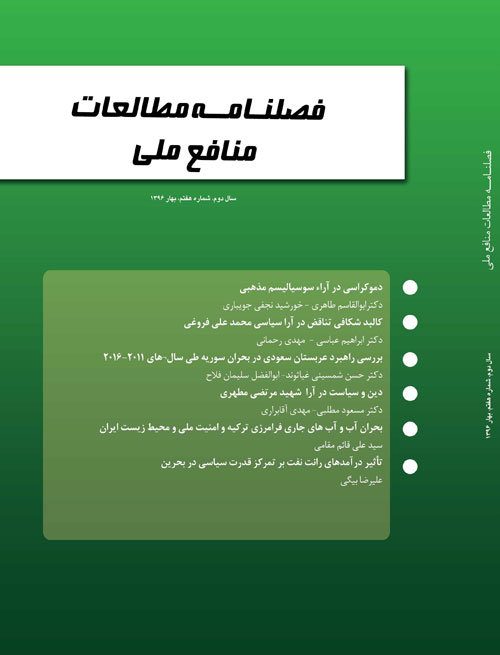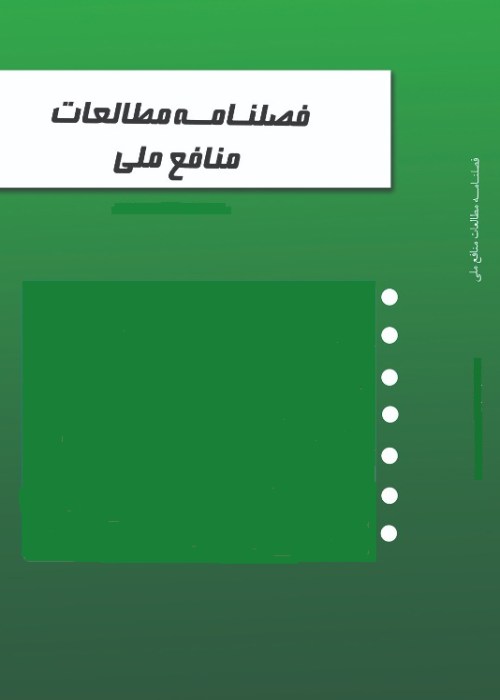فهرست مطالب

نشریه مطالعات منافع ملی
پیاپی 7 (بهار 1396)
- تاریخ انتشار: 1396/03/01
- تعداد عناوین: 6
-
صفحات 1-20
جریان چپ به عنوان جریانی عمده در عرصه سیاسی اجتماعی ایران از دوران مشروطه تا پیروزی انقلاب اسلامی همواره یکی از جریان های سیاسی مطرح در صحنه مبارزات فکری سیاسی علیه نظام سیاسی اجتماعی حاکم بوده است که در این جریان های چپ نهضت خداپرستان سوسیالیست در فضای نسبتا باز سیاسی پس از سقوط رضا شاه توسط محمد نخشب شکل گرفت و جوانان همفکرش نیز متاثر از اوضاع نا بسامان سیاسی و اقتصادی و رنجها و فلاکت هموطنان و آرمان های ملی و باور های دینیشان به فکر چاره جویی و تلاش برای رهایی مردم از این وضعیت بر آمدند. از آنجایی که در این پژوهش از دو گفتمان اندیشه چپ و جریان مذهبی سخن به میان می آید، چارچوب نظری تحلیل گفتمان، به دلیل قابلیت بالای آن جهت تبیین موضوع پژوهشانتخاب گردید. این پژوهش در پی آن است که برای پرسش ذیل، پاسخی مناسب بیابد: جایگاه اندیشه چپ مذهبی در ایران چیست؟ برای پاسخ به پرسش مذکور، به بررسی جریان های چپ و تاثیر مذهب در این جریان ها و نقش آن در جامعه پرداخته است. همچنین دموکراسی را از دیدگاه محمد نخشب به عنوان پایه گذار نهضت خداپرستان سوسیالیست بررسی می کند.
کلیدواژگان: دموکراسی، محمد نخشب، اندیشه چپ، جریان مذهبی، انقلاب اسلامی -
صفحات 21-46
روشنفکران غربگرا نقشی اساسی در ورود و ترویج مفاهیم و آرای سیاسی نوین به ایران در تاریخ معاصر داشته اند. ولی این نخبگان و روشنفکران در فهم تحولات و بنیادهای فکری ایران ناتوان بودند به همین دلیل در نفوذ کارآمد این مفاهیم و بینش سیاسی جدید ابهامات زیادی وجود دارد. محمدعلی فروغی از نخبگان و اندیشمندان دوره پهلوی است که هم در عرصه فکری و هم در عرصه عملی و هم در سیاست گذاری تاریخ معاصر ایران بسیار تاثیرگذار بوده است. او با اندیشه تجدد، فرهنگ غربی، پیشرفت و ترقی وارد صحنه سیاست عصر پهلوی شد. همچنین فروغی در انتقال و ترویج مفاهیمی همچون ناسیونالیسم، بومی گرایی، هویت گرایی ایرانی، وحدت کشور، حاکمیت قانون و دموکراسی تلاش فکری زیادی داشت.
کلیدواژگان: فروغی، پهلوی اول، ناسیونالیسم، مدرنیسم، هویت دینی -
صفحات 47-70
در جریان بحران سوریه، عربستان به حمایت و پشتیبانی از مخالفین نظام به خصوص گروه های سلفی جدید پرداخته است. هدف عربستان سعودی از فشار بر نظام سوریه و حمایت از مخالفان، تغییر دولت سوریه و تضعیف محور مقاومت در منطقه و تغییر موازنه قدرت منطقهای به سود خود است. به زعم مقامات سعودی، واژگونی دولت سیاسی سوریه و به قدرت رسیدن گروه های سلفی جدید باعث می شود که سوریه از اتحاد با ایران و محور مقاومت خارج شده و به ائتلاف عربستان بپیوندد. از جمله اقدامات عربستان سعودی در صحنه سوریه برای تغییر اوضاع، طراحی و برنامه ریزی برای انجام عملیات تخریبی و اعتراضی، حمایت مالی و لجستیکی از گروه های سلفی جدید به ویژه جبهه النصره و جبهه اسلامی، تحت فشار قرار دادن سوریه در عرصه سیاسی و همچنین مجامع بین المللی و منطقه ای و... بوده است. چارچوب نظری واقع گرایی تهاجمی، به دلیل قابلیت بالای آن جهت تبیین موضوع پژوهش انتخاب گردیده است.
کلیدواژگان: بشار اسد، حکومت سوره، عربستان، ایران، جوامع بین المللی -
صفحات 71-96
از نظر مطهری دین اسلام از پتانسیل های بالایی بخصوص در عرصه سیاست برخوردار است. چنانکه نقش دین در تمام شئون زندگی نمودار است. حکومت شانی از شئون پیامبر شناخته می شود و ضرورت است که دین و سیاست همگام باشند. در این راستا ضروری است که تبیین معنای صحیح همبستگی دین و سیاست ارائه شود و جریانات غیر دینی به صورتی علمی مورد بررسی و شناخت قرار گیرند. در فهم اندیشه سیاسی شهید مطهری باید به موضوعاتی از قبیل مشاهده بی نظمی، تشخیص درد، نظم بخشی و فعالیت های مسلمانان توجه داشت. استاد مطهری حکومت اسلامی را حکومتی مردمی می داند که جمودی بر شکل مسائل ندارد و می تواند با مقتضیات زمان و پیشرفت انسان در امور مختلف سازگار و در مورد مشارکت سیاسی با ساز و کارهای موجود می تواند موافق باشد؛ سازوکارهایی نظیر انتخابات، رقابت احزاب که ابزار اصلی مشارکت سیاسی هستند و با اسلام نیز سازگارند.
کلیدواژگان: مطهری، اسلام سیاسی، سکولاریسم، جمهوری اسلامی، مشروعیت -
صفحات 97-117
بحران آب و پروژه گاپ، آبهای فرامرزی ترکیه دجله و فرات و عاصی و ارس زاپ بزرگ، تاثیرات آن بر محیط زیست و آلودگی آبهای دجله و فرات و قوانین اتحادیه اروپا درباره محیط زیست و سیاست آبی ترکیه و پیمان آبهای فرامرزی و توزیع عادلانه آن، لزوم همکاری ترکیه با سوریه و عراق، مسئله اروند رود و خشک شدن هورالاعظیم و ریز گردها، سرمایه گذاری شرکت های کشورهای دیگر در پروژه گاپ، رد اعاهای ایران درباره آثار سوء سد ایلیسو در محیط زیست عراق و ایران توسط وزیر ترکیه، تاکید بر تکمیل سد ایلیسو و سدهای وابسته، اهداف امنیتی ساخت سده های ترکیه بررسی شده است.
کلیدواژگان: ترکیه، آب، بحران، محیط زیست، امنیت ملی -
صفحات 119-150
کشورهایی که ساختار اقتصادی آنان اقتصاد رانتی متکی به نفت هستند، ساختار سیاسی و اجتماعی متمایزی با دیگر کشورها دارند. این تمایز زمانی به وضوح قابل تبیین است که این کشورها دارای اقتصادی تک محصولی و به طور ویژه متکی به نفت یا گاز و یا هر رانت دیگری مستقل از فعالیت های مردمی باشند. کشور بحرین یکی از این کشورهاست که دارای درآمد رانتی متکی به نفت و محصولات نفتی و یا خدمات نفتی است. سوال اصلی این پژوهش که به شیوه توصیفی تحلیلی با استفاده از روش منابع کتابخانه ای گردآوری شده این است که، درآمد های رانتی حاصل فروش نفت در مجمع الجزایر بحرین چگونه موجب تمرکز قدرت سیاسی در این کشور شده است و چرا این درآمدها نتوانسته است رضایت عموم مردم بحرین را جلب کند؟ در فرضیه بیان می گردد که، آل خلیفه از درآمدهای حاصل از فروش نفت برای سرمایه گذاری های شخصی بهره برده و با وجود اینکه این کشور شاهد میزانی از تنوع اقتصادی بوده است اما وضعیت معیشتی شهروندان آن نسبت به درآمدهای کشور نامطلوب است.
کلیدواژگان: نفت، درآمدهای رانتی، قدرت سیاسی، بحرین، آل خلیفه
-
Pages 1-20
Democracy in the Views of Religious SocialismDr.Abolghasem TaheriKhorshid Najafi JouybariAbstract:The Left movement has been a main political and social force since Constitutional Revolution. Since then, it has been engaged struggle with dominant social and political system. After the fall of Reza Shah, Muhammed Nakhshab formed the Movement of God-Worshipping Socialists. The youths, influenced by him, tried to free people from misery and suppression. The authors have chosen the theoretical framework of discourse analysis to explain the subject of research. The main question of the article is: what is the status of religious left thought in Iran? In order to answer the question, the authors would analyze the Left movements, the impact of religion on them and its role in the society. Moreover, the authors would analyze Muhammed Nakhshab’s point of view as a founder of Movement of God-Worshipping Socialists.Key Words: Democracy, Muhammed Nakhshab, the Left Thought, Religious Movement, Islamic Revolution
Keywords: Democracy, Muhammed Nakhshab, the Left Thought, Religious Movement, Islamic Revolution -
Pages 21-46
The Analysis of paradox in Foroughi’ Political ThoughtDr. Ebrahim AbbasiMahdi RahmaniAbstract:Pro-Western intellectuals had a key role in the promotion of modern political thought in Iran. However, they were unable to understand Iran’s developments and Iran's intellectual foundations. Therefore, there are a lot of ambiguities in the efficiency of these modern political concepts. Foroughi, as an elite of Pahlavi era, has been highly influential both in the field of thought and in the field of both practical and policy-making in Iran’s contemporary history. He, as an advocate of modernization, western culture, progress and advancement, entered politics in Pahlavi era. He tried to promote the ideas such as nationalism, Iranian identity, unity of the country, rule of law and democracy.Key words: Foroughi, the First Pahlavi, Nationalism, Modernism, Religious Identity
Keywords: Foroughi, the First Pahlavi, nationalism, modernism, Religious identity -
Pages 47-70
The Analysis of Saudi Arabia’s Strategy for Syrian Crisis (2011-2016)Dr. Hassan Shamsini GhaiasvandAbolfazl Soliman FallahAbstract:During the Syrian crisis, Saudi Arabia has supported the Syrian opposition especially Salafi groups. The goals of Saudi Arabia were to change Syrian regime, to weaken the resistance axis and to change the balance of power in the region. Saudi Arabia officials believe that the overthrow of Syrian regime would force Syria to distance itself from Iran and join an alliance with Saudi Arabia. Saudi Arabia has taken several measures to reach its aims in Syria, including: planning of sabotage acts, financial and logistical support of Salafi groups and exerting pressure on the Syrian government in regional and international institutions. In order to conduct their research, the authors have used offensive realism theory.Key Words:Bashar Assad, Syrian Government, Saudi Arabia, Iran, International Institutions
Keywords: Bashar Assad, Syrian Government, Saudi Arabia, Iran, International Institutions -
Pages 71-96
Religion and Politics in Mottahari’s ThoughtDr.Masoud MotalebiMehdi Agh BrariAbstract:According to Mottahari, Islam has high capacity to participate in politics. The religion plays a significant role in the life. To establish a government is part of the Prophet’s plan. The link between religion and politics is necessary. So it is essential to analyze the non- religious movements scientifically. In order to understand Mottahari’s thought, we should pay attention to the disorder, the diagnosis of pain, order and activities of Muslims. Mottahari describes Islamic government as a popular government, which could be compatible with present conditions and human progress. He believes that mechanisms like elections, parties’ competition are compatible with Islam.Key Words:Mottahari, Political Islam, Secularism, Islamic Republic, Legitimacy
Keywords: Mottahari, Political Islam, secularism, Islamic Republic, legitimacy -
Pages 97-117
Water Crisis, Running and trans-boundary Water of Turkey, National Security and Iran’s EnvironmentSayed Ali Ghaem MaghamiAbstract:The authors would investigate the water crisis between Iran and Turkey, including: Water crisis and Gap project, trans-boundary waters of Turkey, Tigris and Euphrates, Assi and Aras Zap, its impacts on the environment and pollution of the Tigris and Euphrates, and the EU rules on the environment and water policy of Turkey and the trans-boundary water treaty and its fair distribution, The need for Turkey to cooperate with Syria and Iraq, the issue of Arvand River and the drying up of oil and gas, investment by other countries in the Gap project, the rejection of Iran's policies on the damaging effects of the Ilisu dam in the environment of Iraq and Iran by the Turkish Minister, The completion of the Ilyosu dam and related dams and the security objectives of Turkey's dams.Key Words: Turkey, Water, Crisis, Environment, National Security
Keywords: Turkey, Water, Crisis, Environment, national security -
Pages 119-150
The Impact of oil revenues on political power in BahrainAli Reza BighiAbstract:The countries in which their economic structure is relied on oil, their political and economic structure is different from other countries’. These countries have one-product economy, especially oil and gas. Bahrain is among those countries who rely on oil and oil products. The main question of the article is: how does oil revenues lead to the concentration of political power in Bahrain and why don’t oil revenues satisfy Bahraini people? The hypothesis of the article is: Al Khalifeh uses oil revenues to invest in favor of himself. Despite the fact that the country has witnessed a degree of economic diversification, the livelihood of its citizens is undesirable.Key Words: Oil, Renter Revenues, Political Power, Bahrain, Al Khalifeh
Keywords: Oil, Renter Revenues, Political Power, Bahrain, Al Khalifeh


